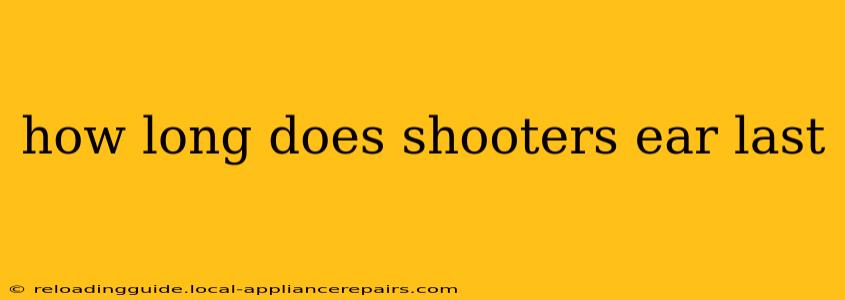Shooters ear, also known as noise-induced hearing loss (NIHL), is a prevalent condition among individuals exposed to loud noises, particularly those who frequently engage in shooting sports. The duration and severity of shooters ear aren't uniform; it depends on several factors, making it crucial to understand both the short-term and long-term effects. This article will delve into the timeline of shooters ear, its symptoms, and available treatments.
The Timeline of Shooters Ear: Immediate to Long-Term Effects
The effects of noise-induced hearing loss aren't always immediately apparent. The timeline can be broken down into several stages:
Immediate Effects (Within Hours):
- Temporary Threshold Shift (TTS): After exposure to loud noises, you might experience temporary hearing loss. This manifests as muffled sounds, ringing in the ears (tinnitus), and a decreased ability to hear softer sounds. This TTS usually resolves within hours or days, but repeated exposure can lead to permanent damage. Think of it like a muscle strain – it recovers, but repeated strain leads to lasting injury.
Short-Term Effects (Days to Weeks):
- Persistent Tinnitus: If the TTS doesn't fully resolve, persistent tinnitus might develop. This constant ringing, buzzing, or hissing in the ears can be incredibly disruptive and frustrating.
- Hyperacusis: This is increased sensitivity to everyday sounds. Sounds that were previously tolerable might become painfully loud.
Long-Term Effects (Months to Years):
- Permanent Threshold Shift (PTS): Repeated or prolonged exposure to loud noises leads to permanent hearing loss. This is characterized by a consistent reduction in hearing ability, often affecting certain frequency ranges more than others. This damage is irreversible.
- Progressive Hearing Loss: The hearing loss associated with shooters ear can progress over time, even after exposure to loud noises ceases. The extent of progression depends on the severity of initial damage and individual factors.
Factors Influencing the Duration and Severity of Shooters Ear
Several factors influence how long the effects of shooters ear persist:
- Intensity of Noise: The louder the noise, the greater the risk of hearing damage. The duration of exposure is also crucial.
- Duration of Exposure: Prolonged exposure to even moderately loud noise can cause significant damage.
- Frequency of Exposure: Regular exposure to loud noises, even for short periods, significantly increases the risk of permanent hearing loss.
- Use of Hearing Protection: Consistent use of appropriate hearing protection, such as earplugs or muffs, is vital in mitigating the risk and severity of noise-induced hearing loss.
- Individual Susceptibility: Some individuals are more susceptible to noise-induced hearing loss than others due to genetic factors or pre-existing conditions.
Treating Shooters Ear: Managing and Mitigating the Effects
Unfortunately, there's no cure for permanent noise-induced hearing loss. However, treatment focuses on managing symptoms and preventing further damage:
- Hearing Aids: These devices amplify sounds to compensate for hearing loss.
- Tinnitus Management: Strategies such as sound therapy, counseling, and medications can help manage tinnitus symptoms.
- Hearing Protection: The most effective way to prevent further damage is through consistent use of appropriate hearing protection during shooting activities.
- Lifestyle Changes: Minimizing exposure to loud noises in daily life can help slow down the progression of hearing loss.
Conclusion: Prevention is Key
While the timeline of shooters ear varies, the importance of prevention cannot be overstated. Consistent use of hearing protection is crucial for anyone engaging in activities involving loud noises, particularly shooting sports. Early detection and management of hearing loss can significantly improve the quality of life for those affected. If you experience any symptoms of noise-induced hearing loss, consult an audiologist for a comprehensive hearing evaluation and appropriate management strategies.

